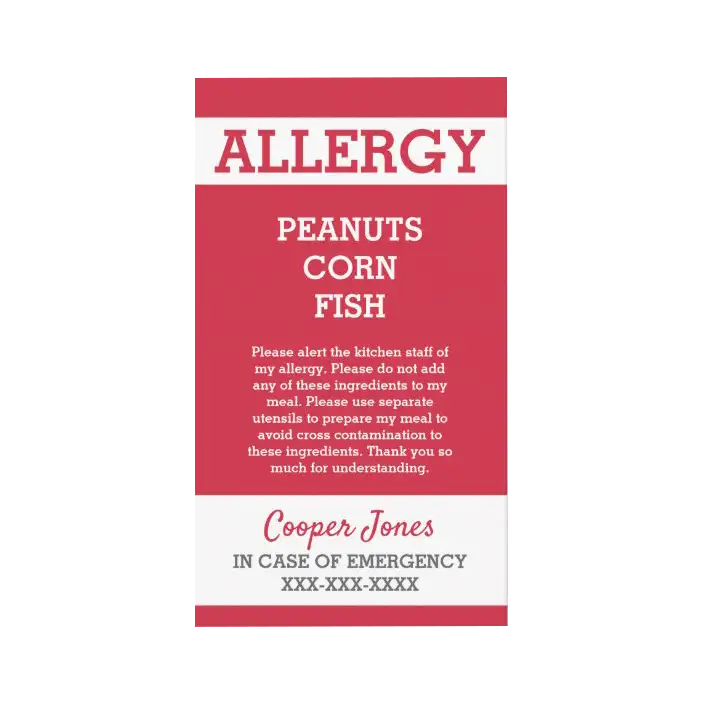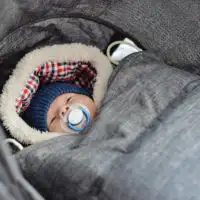Traveling with children is challenging. Adding in the element of food allergies can take parental anxieties to the next level. As a mom of a son who has allergies to gluten, wheat, egg, peanuts, almonds, fava beans, chickpeas, and sesame, I’ve become an expert at dealing with food allergies while traveling.
For most allergy families, travel can be done safely if the proper precautions, planning, and packing are done well. These tips and tricks aren’t fool-proof, but can provide some tools and ideas to help navigate a fun (but safe) traveling experience for your family.
Research and Prepare
Research what the traditional local cuisines are, what ingredients are used in these dishes, and how they are prepared. This can help you gauge a “starting point” to what foods should be readily available for your customization.
I always notify the hotel (via phone and email) about my son’s allergies prior to check-in. That way, the hotel can make a note in their system about our restrictions, so they can plan accordingly. If they typically offer welcome drinks, or snack packages in the room for check-in, perhaps they can include options for your child with allergies as well.
Research the room options available at the hotel. Do they have suite style rooms available? We try to stay in hotels with separate sleeping areas if possible. In addition to it being nice to be able to watch a movie and have a glass of wine with your partner when the kids go to sleep early, such rooms typically include a small kitchen space as well, which is a huge convenience for allergy families. If a suite style is not an option, find out what kitchen appliances are available in a standard room. Is there a refrigerator? Does it have a freezer section? Is there a cooktop/stove or a microwave for warming up leftovers or making a simple meal in the room? Leftovers can be crucial for kids in general, but especially for allergy kids. If they don’t want to eat at a certain time, or there were too many distractions at the restaurant for them to focus on their meal, the ability to reheat their food can be a lifesaver! Additionally, if they find something they really love, order an extra portion “to go”—and have that as a meal plan for the next day or two.
Read All Labels

When buying pre-packaged foods internationally, it is critical to READ ALL labels. Food manufacturers have different laws to abide by in different countries, and the same standard of ingredient listing and allergen documentation may not be streamlined. An approved item at your home may not necessarily have the exact same ingredients and make up when packaged overseas. Allergens are not always labelled the same way, and in the same verbiage, and entire ingredient lists may vary as well. Do not let the same logos and colors and packaging fool you—you must read the details, and read in between the lines to ensure your child’s safety.
Pack Food From Home
I recommend all allergy families travel with food from home. My “food suitcase” usually includes dry pasta, cereals, breads, and plenty of packaged snacks. That way, you can always have an alternative for your child if modifications aren’t able to be made for them at a specific restaurant. It will ease the stress of knowing there is a “backup plan”.
Keep Medications/EpiPens Close
I always have at least a two days’ worth of snacks and non-perishable meals in my carry-on (just in case of delays, or luggage issues, etc.). If your child takes medication or has an EpiPen, be sure it is in your personal item/carry-on (not checked luggage). It should be in the item that goes under the seat in front of you, not the overhead bin, as items shift in flight, or sometimes get moved by flight attendants or other passengers. I recommend a getting an EpiPen carrying case for travel so that it is protected from other items (but also readily accessible) and clearly marked in case of emergency.
Research Dining Options

I research the restaurants from the hotel website, and then try and see if they have their own website or social media platform as well. Make sure to check the specifics (when they are open, what hours, what days, and what meals they serve). Right now, many hotels are not operating at 100% capacity. Even if there are four restaurants on-site, they may only have one or two open on a given day, perhaps with modified hours, so you need to plan ahead.
Get access to their actual menu (not a sample menu), if possible. I typically direct message restaurants on Instagram for the quickest replies. I love when restaurants have a “key” with carefully marked allergens for each dish on their menus. Even if it doesn’t have your specific allergen noted, it shows me that they take care and pay attention to detail on the ingredients list.
Make Reservations
Even if it is for a slow Monday lunch, always make a reservation! Most restaurants have an online platform to take reservations and there is usually an empty box to note if there is a birthday, anniversary, etc. I always use this space to include our allergen restrictions ahead of time. That way, no one is surprised when you arrive.
Allergy Business Cards
I can’t recommend this idea enough! Do yourself a favor and go have an allergy business card made up. It should include your child’s name (and their photo, if you wish) and a clearly marked list of their allergens. I chose to include emergency contact details as well. If you are traveling internationally, having cards made up in the native language of your destination is an excellent idea. You never want something to get lost in translation when it comes to your child’s health. I hand the business card to the server at the start of the meal, that way they don’t need to take notes, and can take the card with them and speak with necessary restaurant personnel (the chef, manager- or whomever is protocol at their restaurant). An example is here:

Ordering
Sometimes having too many options can be overwhelming, I like to say to the server “in a perfect world, my son would want grilled chicken, French fries and fruit—is it possible to prepare that safely given his restrictions?” You will need to be flexible with “safe” and “approved” options, depending on the flexibility of the restaurant, and the threat-level of the allergen—but it doesn’t hurt to ask for exactly what you want out of the gate!
We travelled to the Andaz Costa Rica recently, and I was blown away by the service (in general and in regard to my sons’ allergies). Breakfast is traditionally challenging given his allergies (gluten and eggs are staples for most menus globally). One morning, when I noticed they were slower than days prior, I asked if it would be possible to make him something sweet that was off-menu. I suggested pancakes, waffles or crepes… basically anything he could smother in syrup! The server brought our allergy business card to the kitchen and relayed that the chef said that it would take a few extra minutes because they were starting from scratch, but he was happy to help. Chef Javier was able to create the most delicious pancakes for him, and we were so appreciative.
Oftentimes, I feel badly inconveniencing staff with my son’s allergies. Having worked in hospitality, I know how busy and stressful things can be as is—so I make an effort, if I’m going to ask or request something special, that I do so when it appears to be “off-peak” time.
Traveling with kids can be stressful and adding in food allergies adds another element of worry. Planning ahead and packing appropriately will cut down on anxieties so that you can focus your efforts on family time.
As always, please consult your physician for your child’s specific medical needs and restrictions as it relates to travel.
You Might Also Like:
• 9 Baby Car Seat Covers That Will Protect Your Baby All Winter Long• Ultimate Guide to Everything Pumpkin Spice
• The 8 Best Portable Potties and Toilets
• Best Amazon Prime Day 2021 Deals for Travelers
• 11 Best Sunglasses for Babies and Toddlers in 2021
Our team of parents and travel experts chooses each product and service we recommend. Anything you purchase through links on our site may earn us a commission.







